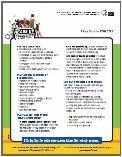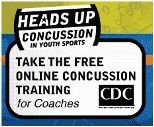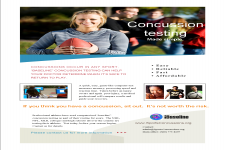Athletes
- Created on Friday, 07 January 2011 08:29
- Last Updated on 18.09.2012
- Published Date
 Knowing the signs and symptoms of concussion is important. If you think you may have suffered a concussion:
Knowing the signs and symptoms of concussion is important. If you think you may have suffered a concussion:
1) Take yourself out
If you think you may have suffered a concussion, take yourself out of the game or practice. Make sure you consult a health care professional before resuming physical activity. It is important not to suffer another injury until the first one has completely healed. Know the signs and symptoms of a concussion and remember that it can take time for them to appear, sometimes hours or days after the injury occurs.
If you think you have a concussion, sit out. It's not worth the risk.
2) Signs and symptoms of concussion
|
|
|
|
|
|
|
|
|
|
|
|
|
|
|
|
|
|
|
| https://
3) Tell someone
A person who suffers a concussion is not always the best judge of how badly they are hurt, because their brain may not be working properly. If you think you may have a concussion, or just aren't feeling "quite right" and you have one or more signs/symptoms of concussion, tell someone, preferably your coach, parent or another adult.
4) Make sure to seek medical help
It is important to consult a medical provider who is trained in the diagnosis and management of concussion. Don't judge the severity of the injury yourself. Concussions can be very unpredictable. A qualified medical professional will be able to diagnose your injury and guide you through the recovery process. They may recommend complete rest, both physical and cognitive, as the brain needs both to heal. This typically means no physical activity and limiting brain activity like watching TV, texting, reading, and computer use.
5) Give yourself time
Your brain needs time to heal. Concussions are as individual as the athlete who sustains it, and no one can predict, at the time of injury, how long healing will take. Physical and cognitive rest are often the shortest route to recovery. It is important not to return to physical activity or cognitive activity such as a full day of school, until your medical provider says it is safe to do so.
6) Obtain written medical authorization
Many states require athletes to obtain written medical authorization before they are allowed to return to play. If your state does not have a concussion law with this stipulation, it's a good practice to follow anyway. Make sure you are evaluated by a medical professional who is trained in the diagnosis and management of concussion. It's important to inquire.
6) Return to play gradually
In 2008 an international panel of concussion experts developed a gradual return-to-play protocol for all athletes returning to activity after concussion. Increase your physical activity gradually, so you can tell your medical provider if you are truly symptom-free and ready to return to full participation. If symptoms return when you do light drills or increase your heart rate, tell your parents who should contact your medical provider.
7) Be honest
Many of the high school athletes who have suffered catastrophic injuries such as second impact syndrome, played with symptoms from a previous concussion. In some cases their friends knew, but didn't know how dangerous it was so they didn't speak up. Be honest with your parents, your medical professional and your coaches. It is impossible to know who will be lucky or who will require brain surgery.
8) Help a teammate
If you suspect a teammate has suffered a concussion, speak up, tell a coach or his/her parents. You might just save a life.
https://
Links:
Brain Health
Children and young adults scanned multiple times by computed tomography (CT), a commonly used diagnostic tool, have a small increased risk of leukemia and brain tumors in the decade following their ...
read more...-
Why concussions affect people differently
Bronx, NY — Patients vary widely in their response to concussion, but scientists haven’t unde...
-
Teens miss recovery clues after concussion
PITTSBURGH — When recovering from concussion, young athletes rely too much on how they f...
-
Discovering the roots of migraine
Common questions encountered during the post-concussion exam are often migraine-related. Do you...




Neuroscience
NFL Hall of Famer "Iron Mike" Webster's life ended in 2002 when he suffered a heart attack at age 50. Four Super Bowl rings, nine Pro Bowls, and voted to the NFL's all-time team in 2000, the driven, ...
read more...-
Progesterone seems to protect neurons after injury
It is not yet known why girls suffer concussions at a higher rate than boys. The most prevalent...
-
911 signal relay sends help to brain injury
Like emergency workers rushing to a disaster scene, cells called microglia spe...
-
GPS for the brain; the "connectome"
Athens, Ga.- University of Georgia researchers have developed a map of the human brain that shows...
Resources
- School professionals play an important role in the health of all students. Recognizing the signs and symptoms of concussion is important, as is managing their return to school post-injury.
- Some ...
- https://
- CDC's Concussion Training for Clinicians
-
Concussion Education Video Programs - ...
Parents, athletes, coaches and medical professionals have access to concussion education created...
-
New concussion guidelines for team ...
INDIANAPOLIS – Team physicians who assess and treat athletes suspected of concussion have new ...
The risk of concussions in young football players
Marjorie Albohm President, National Athletic Trainers' Association
quick links
Latest News
Concussions Occur...
...in Any Sport
REMOVE athlete from play
REFER to medical provider
REST no sports, no texting/TV
RETURN only with doctor's OK
Source: Children's Hospital Boston, Sports Concussion Clinic

































